Tag Archives: North Atlantic right whale
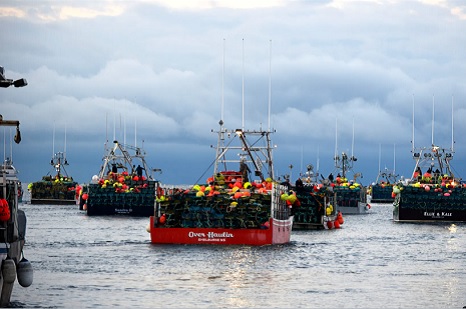
East Coast lobster harvest sustainable, according to non-profit’s criteria — but a Seafood Watch report advises consumers to avoid it
A recent report by a California-based seafood assessment group has the East Coast lobster industry seeing red. While Seafood Watch has put lobster on its “red list” and recommend consumers avoid it, lobster fisheries in most areas of Atlantic Canada have been certified sustainable by another group that has significant credentials in the business of seafood accreditation. In existence for about 25 years, the Marine Stewardship Council is a global non-profit organization that works to end overfishing around the world. Catherine Pigeon-Dubeau, fisheries and commercial manager for MSC in Eastern Canada, said the last review of the East Coast lobster fishery was in July of this year, and the Blue Label certification remains in place. >click to read< 14:10

On The Ropes – Federal court rules against lobster industry in appeal of whale protection regulations
“Obviously, it’s devastating to the lobster industry,” Stonington Town Manager Kathleen Billings told the Islander. Stonington lands by far the most lobsters in the state. In total, Maine lobstermen added an estimated $724,949,426 worth of lobster landings to the state commercial fishery in 2021. “We have a lot at stake,” Billings continued. “[Lobstering] makes up $60 [million] to $70 million to our economy and to have this recent ruling, and also too with the Seafood Watch list designation, they pretty much put a torch to our industry and burnt it to the ground for us.” >click to read< 08:55
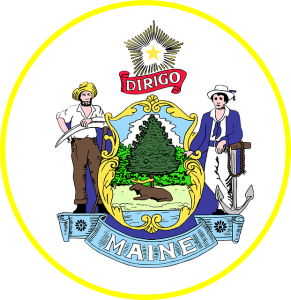
Maine Delegation Presses Fisheries Agency for Fair Treatment of Maine Lobster Fishery
After the National Marine Fisheries Service (NMFS) gave lobster industry participants just two business days to submit proposals for a new risk reduction plan to protect right whales and denied lobstermen and their allies access to a key data tool, Maine’s congressional delegation pushed back today against these decisions by the agency. In their letter to NMFS, Congressman Jared Golden (ME-02), Senators Susan Collins (R-ME) and Angus King (I-ME), and Congresswoman Chellie Pingree (ME-01) called out the agency for drastically accelerating the timeline for proposals in the aftermath of a recent decision by the U.S. District Court invalidating a biological opinion for the North Atlantic Right Whale. >click to read< 09:21

I’m for the local guys
Just to let you know, in case you might have forgotten, that I am a Hoosier. I was born and raised in Indiana. I am from away. I tell you this stuff to let you know that while I am from away, my bride convinced me to adopt this state and switch my allegiance to reflect the views of my friends and neighbors. So, I think it is a damn shame that a scientific organization, from away, from California, no less, declared war on my local friends, the lobster fishermen. Somehow, without evidence, a respected marine scientific institution encouraged the nation to eliminate lobsters from stores and menus. Despite their statistical evidence to the contrary, they decreed that lobster fishing gear is the main reason the population of the mighty right whale is in peril. >click to read< 07:36
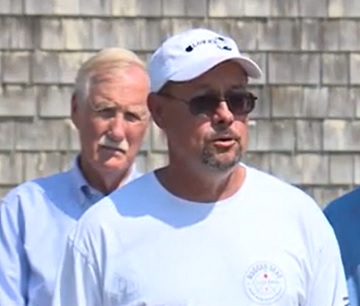
Maine lobstermen, politicians rally in protest of fishing restrictions and Seafood Watch’s recommended boycott
At a rally in Portland’s Old Port on Friday, they protested a federal judge’s ruling issue Thursday allowing the National Marine Fisheries Service, a branch of the National Oceanic and Atmospheric Association to impose limits on where and how lobstermen fish in order to protect endangered North Atlantic Right Whales. The rally was also protesting Seafood Watch, a California-based sustainable seafood advocacy group affiliated with the Monterey Bay Aquarium, now recommending food distributors and restaurants boycott Maine lobster in the name of saving the whales. Video, >click to read< 09:55
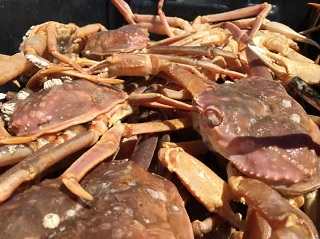
FFAW Responds to Seafood Watch “Avoid” Placement of Snow Crab, Norther American Lobster
The FFAW is responding to the US-based Monterey Bay Aquarium Seafood Watch which has placed North American lobster and Canadian snow crab among seafood species to “avoid.” The reason is based on the potential impact of gear on the North Atlantic right whale which is prone to entanglements with surface gear. The Fisheries Union says the North Atlantic right whale is not commonly found in waters around Newfoundland and Labrador. According to the union, there have only been three sightings of North Atlantic right whales in waters around this province in the last number of years, and no reports of entanglements. >click to read< 07:59
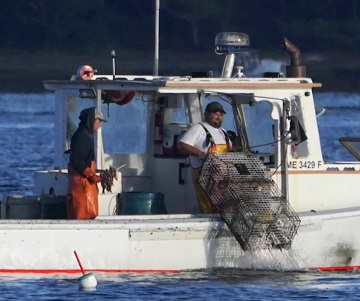
Lawmakers issue strong rebuke after con group adds lobster to ‘red list’
Seafood Watch, a conservation organization based at the Monterey Bay Aquarium in California, this week put North Atlantic lobster on its “red list” of seafood to avoid, as a hope to protect endangered species like the North Atlantic right whale. Since the announcement, lawmakers from both states, Maine and Massachusetts, have issued a strong rebuke against the conservation organization, coming to the defense of an industry they say is unfairly being targeted. Sen. Angus King, I-Maine., held a press conference with Maine’s Governor Janet Mills and joined a statement cosigned by Maine’s entire congressional delegation, calling the “red list” designation “reckless” and “irresponsible.” “Massachusetts Lobstermen know this issue, care about this issue, and have remained committed to doing their part despite regulations that entail major sacrifices by the industry,” Sen. Ed Markey, D-Mass. Video, >click to read< 09:50

U.S. District Court Judge James E. Boasberg rejects bid to block to new lobstering rules
A federal judge on Thursday shot down a challenge by lobstering groups to federal rules intended to protect endangered North Atlantic right whales. U.S. District Court Judge James E. Boasberg rejected a bid by the Maine Lobstermen’s Association, the Massachusetts Lobstermen’s Association and the state of Maine to block federal regulators from imposing new limits on where and how lobstermen can fish in federal waters. The court, which had previously ruled that new federal regulations didn’t go far enough in protecting right whales, said Thursday that the state and lobstering groups couldn’t delay or derail the regulations. Boasberg rejected the lobstering groups’ contention that the National Marine Fisheries Service’s regulations overstated the risk that lobstering posed to the whales and overregulated the industry. >click to read< 20:04
Governor Mills Blasts Federal Court Decision in Lawsuit Challenging Federal Regulations Hurting Maine’s Vital Lobster Industry >click to read<
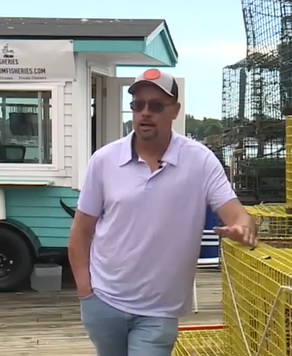
“I don’t think they understand that we’re being mislabeled. We are sustainable.”
The Monterey Bay Aquarium in California has a Seafood Watch program that rates U.S. and Canadian fisheries on their sustainability. The watchdog group just red listed American lobster fisheries in Maine, advising consumers, retailers and restaurants to avoid purchasing lobster from Gulf of Maine and Georges Bank. The report claims that lobster gear poses a risk to the endangered North Atlantic right whale. It’s an assessment that lobstermen say is unfair and inaccurate. “We’re marking our gear different from everybody else,” said lobsterman Steve Train. “So you can tell it’s not happening. We are meeting the goal.” Video, >click to read< 07:45

ENGO recommends against consuming lobster over danger to whales
Seafood Watch, a program out of the Monterey Bay Aquarium, says entanglement in fishing gear is the leading cause of death of the critically endangered North Atlantic right whale population, and US and Canadian lobster fisheries aren’t doing enough to prevent it. Jennifer Dianto Kemmerly is vice president of global ocean conservation at the Aquarium. “We really want consumers and businesses to be aware of how dire the situation is,” Kemmerly said. Meanwhile, the international conservation group Oceana blamed the National Marine Fisheries Service for failing to update safeguards that would protect both right whales and lobster fisheries. To remove the red listing, it recommends using ropeless gear, expanding seasonal closures where whales are present, and improving transparency and monitoring of fishing vessels. >click to read< 18:11
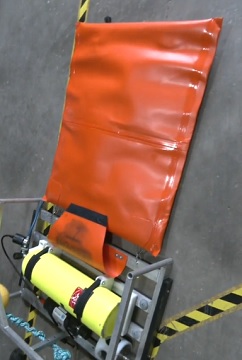
Innovative ropeless fishing gear helps prevent whale entanglements
When fishing zones get closed down due to whale sightings, fish harvesters now have a new place to turn. Can Fish is a program set up by the Canadian Wildlife Federation to allow fishers to test out and use groundbreaking ropeless technology for free. The North Atlantic right whale is one of many marine species being impacted by the changing ocean temperatures in a warming world. The whales have been swimming northward moving from the Bay of Fundy to the Gulf of St. Lawrence,,, The Canadian Wildlife federation is trying to lessen this risk by popularizing the use of ropeless fishing gear through its newly introduced Can Fish program. At a warehouse in Halifax, Nova Scotia, fish harvesters can show up and borrow innovative ropeless fishing gear for free. The catch? These fishers need to provide data collected as they use the innovative technology in order to help build future designs of the equipment. Video, photos, >click to read< 17:30
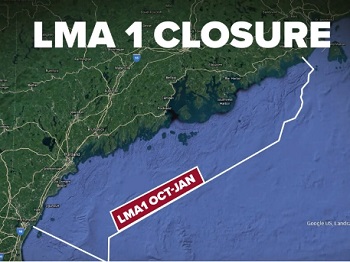
Maine Lobstering Union drops part of lawsuit against NMFS
The Maine Lobstering Union is agreeing to drop part of its lawsuit against the National Marine Fisheries Services, where the federal agency is closing a 960-square-mile section of the Gulf of Maine to lobster fishers. The area, known as LMA 1, is home to hundreds of fishermen like Tyler Turner of Portland. If the closure stands without a state-level court injunction, then Turner said he would lose out on at least half his income. “It’s going to be catastrophic. It’s going to be crippling. I just want to be able to work. I can relieve myself. I don’t need someone telling me where I can’t go,” Turner said. Video, >click to read< 08:14
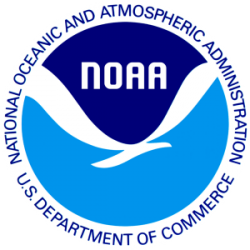
NOAA Fisheries Issues On-Demand Gear Exempted Fishing Permit
August 23, 2022 – Yesterday, NOAA Fisheries issued an Exempted Fishing Permit (EFP) to the NOAA Northeast Fisheries Science Center (Center) to continue trials of on-demand gear in the American lobster fishery. The EFP will provide an exemption from Federal lobster gear marking requirements for approximately 30 federally permitted commercial lobster vessels, with the potential to increase to up to 100 vessels total during the one-year project period. The EFP will allow participating vessels to test alternatives to static vertical lines in trap/pot fisheries (also referred to as on-demand gear), including up to 30 vessels fishing in Atlantic Large Whale Take Reduction Plan Restricted Areas with no static vertical lines. >click to read< 14:18

Entangled North Atlantic Right Whale spotted off Shippagan, N.B.
The federal Fisheries Department is on the lookout for an entangled North Atlantic Right Whale in the Gulf of St. Lawrence near Shippagan, N.B. The department says the whale was observed on Saturday by a Fisheries and Oceans Canada aircraft. The whale, which has been identified as the 2021 calf of the whale known as 3720, was spotted about 48 nautical miles east of Shippagan. Officials said they do not know the type of gear that the whale is entangled in, or where it came from. >click to read< 08:14
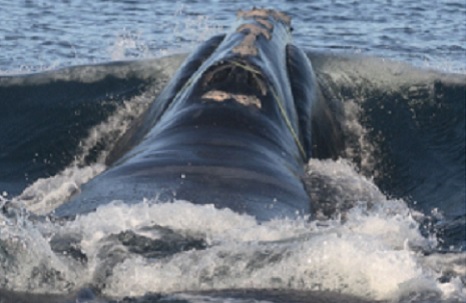
Nova Scotia: Indigenous lobster fishermen not required to observe whale closure
A Department of Fisheries and Oceans fishery closure in Nova Scotia this week to protect endangered North Atlantic Right Whales will not apply to Indigenous lobster fishermen in the area. The department is allowing ceremonial lobster fishing in St. Marys Bay to continue, raising concerns about conservation and fairness. All commercial crab and herring fisheries with unattended gear in the water are being ordered out of St. Marys Bay effective 5 p.m. on Thursday, which is standard practice after sightings. Dan Fleck of the Brazil Rock 33/34 Lobster Association represents commercial fishermen in the area. He said he’s been getting calls from concerned fishermen this week. “I would expect that the rules would be applied fairly and equitably amongst all resource users,” Fleck said. >click to read< 08:01

NOAA lays out plans for expanded testing of ropeless fishing technology
In an effort to address the two main causes of human-induced whale mortality, vessel strikes and entanglement in fishing gear, the National Oceanic and Atmospheric Administration recently released rules to reduce ship speeds and its “Ropeless Roadmap” to prepare for widespread adoption of ropeless fishing. The vertical lines that connect strings of traps on the ocean floor to buoys on the surface can get caught on a whale’s fins or in its mouth as it swims, leading to death in some cases. There are fewer than 350 North Atlantic right whales, according to NOAA. On-demand fishing gear would eliminate the need for the vertical lines in the water until the lobster trap, pot or gillnet is being hauled. >click to read< 15:50

North Atlantic right whales at Risk – Offshore wind farms bring a lot of unknowns
The race is on to get offshore wind farms built off the U.S. East Coast, and North Carolina is one of the leading states with three projects planned for the Tar Heel Coast, two roughly 20 miles south of Bald Head Island in Brunswick County and one, which will be built first, about 27 miles off Kitty Hawk on the Outer Banks. And they might not be the last for the state’s coastal waters. While visiting a National Governors Association event in Wilmington last month, Gov. Roy Cooper was asked if he’d support more offshore wind built off the N.C. coast. “Absolutely,” he responded emphatically. >click to read< 09:26
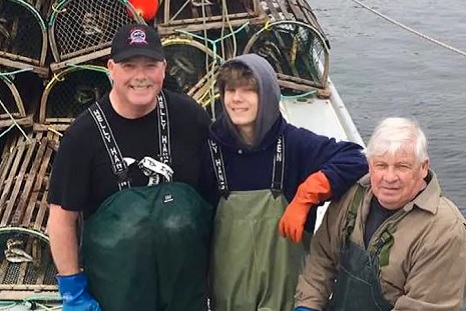
Regulations coming to Atlantic Canada could ensure safety of endangered right whales
Last month, Sierra Club Canada held a web discussion where it talked about the endangered North Atlantic right whale population in the Gulf of St. Lawrence and how new changes coming to the fishing industry could help protect them. DFO has been working to develop rope systems that are designed to release if too much force is applied suddenly. Currently, there are no regulations for fisherman to use low-bearing gear. Jenn Michael Lewis, who helps catch lobster in St. Peters Bay, said the response from fishermen in the community about the new rope regulations will likely be a negative one. “It has been a point of tension. There isn’t many right near St Peters Bay, many fishermen don’t see the point in switching,” Lewis said. >click to read< 08:10
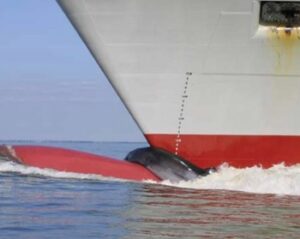
Ship Strikes: Ships must slow down more often to save whales, feds say
Vessels off the East Coast must slow down more often to help save a vanishing species of whale from extinction, the federal government said Friday. Efforts to save the whales have long focused on fishing gear, especially that used by East Coast lobster fishermen. The proposed vessel speed rules signal that the government wants the shipping industry to take more responsibility. “Changes to the existing vessel speed regulation are essential to stabilize the ongoing right whale population decline and prevent the species’ extinction,” state the proposed rules, which are slated to be published in the federal register. Fishermen are unfairly being held accountable for whale deaths that occur due to vessel strikes, said Patrice McCarron, executive director of the Maine Lobstermen’s Association, which is the largest fishing industry association on the East Coast. >click to read< 11:33
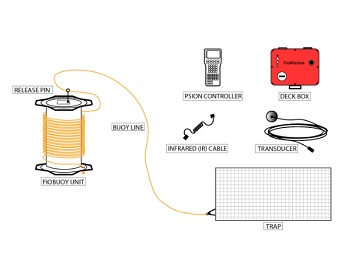
Local organization set to help fish harvesters switch to whalesafe gear
A Halifax-based organization has received $4.4 million from the Department of Fisheries and Oceans Canada (DFO) Whalesafe Gear Adoption Fund to establish a program aimed at fish harvesters transition to safer equipment. The not-for-profit Canadian Wildlife Federation (CWF) received the funding to establish the CanFish gear lending program to help recover the North Atlantic Right Whale while sustaining commercial fisheries. Among its trial gear is rope on-demand which, according to their website, can be “used to leave something on the ocean floor and retrieve it at another time without leaving a persistent line in the water column.” >click to read< 08:15
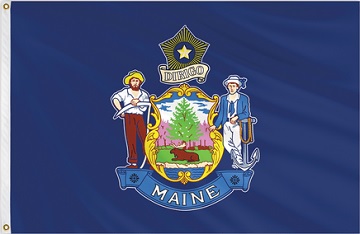
Maine’s fishermen and farmers are under assault – When a flag is more than a symbol
With the livelihoods of both Maine’s fishermen and farmers under assault, Sam Patten talks about the importance of keeping the traditional state flag. In the event this should come up again, (Last year, the Maine Legislature shot down a bill,) I’d go a step further and suggest that changing the state flag is anti-human, and anti-Mainer. Does this take the question to the extreme? Maybe, but it matters. Right now, both fishermen and farmers in Maine are under assault. The National Oceanic and Atmospheric Administration has put in place restrictions on the lobster fishing industry in an ill- conceived effort to save the endangered right whale. Science does not support NOAA’s finding, but well-heeled environmentalists do. So does the wife of the chief-of-staff to the president of the United States. Meanwhile, the question of “forever chemicals,” or PFAS, has already spelt ruin for some Maine farmers whose soil was contaminated,,, >click to read< 15:47
conceived effort to save the endangered right whale. Science does not support NOAA’s finding, but well-heeled environmentalists do. So does the wife of the chief-of-staff to the president of the United States. Meanwhile, the question of “forever chemicals,” or PFAS, has already spelt ruin for some Maine farmers whose soil was contaminated,,, >click to read< 15:47

Mills & Maine Congressional Delegation Respond to First Circuit Court’s Decision
Portland, Maine – Governor Janet Mills and U.S. Senators Susan Collins and Angus King and U.S. Representatives Chellie Pingree and Jared Golden issued the following statement today in response to the First Circuit Court of Appeals’ decision reinstating a ban on lobster fishing gear in nearly 1,000 square miles in the Gulf of Maine: “Once again, Maine’s lobstermen have been unfairly targeted by a misguided court decision. Today’s ruling fails to acknowledge the substantial steps that Maine’s lobster industry has already taken to comply with gear change rules to protect the North Atlantic Right Whale. We are deeply disappointed and will continue to strongly advocate for our state’s lobster industry.” >link<
Maine politicians blast ‘unfair’ court decision targeting lobster gear – A federal circuit court has reinstated a ban on lobster fishing gear in a nearly 1,000-square-mile area off New England to try to protect endangered whales. The U.S. District Court for the District of Maine issued a preliminary injunction to halt enforcement of the rules. The U.S. Court of Appeals for the First Circuit in Boston vacated that ruling Tuesday. >click to read< 11:09

DC North Atlantic Right Whale Ruling
“The MLU is exploring all legal options to ensure that forthcoming judicial decisions on NOAA and NMFS’s arbitrary assumptions will finally result in some meaningful protections for the NARW that do not needlessly jeopardize Maine’s heritage industry without any corresponding benefit to the right whale population” Virginia Olsen. Judge Boasberg was correct in stating “the crux of the problem is that the 2021 BiOp projects that in the coming years the American lobster fishery will continue to potentially kill and seriously injure North Atlantic right whales at over three times the sustainable rate.” That projection is not supported by the best scientific available – far from it in fact. Until NOAA and NMFS stop relying on arbitrary assumptions and apportionments and start paying attention to the best scientific data available, which reveals that Canadian fisheries are the source of almost all known causes of entanglements, then both the North Atlantic right whale and the American lobster fishery will go extinct. 13:02
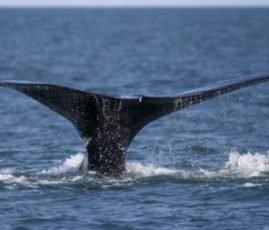
Federal court rules fisheries officials didn’t do enough to protect right whales from lobster gear
A federal court on Friday ruled in favor of environmental groups that had filed a lawsuit against the government and the Maine Lobstermen’s Association claiming federal fisheries officials had failed to protect endangered North Atlantic right whales from potentially fatal entanglements in lobster fishing gear, records show. A judge ruled that NOAA Fisheries had violated the Marine Mammal Protection Act and Endangered Species Act when it issued a May 2021 biological opinion and a September 2021 final rule because officials had not done enough to reduce the lobster fishery’s threat to right whales, the plaintiffs in the suit said in a statement. >click to read< 18:00
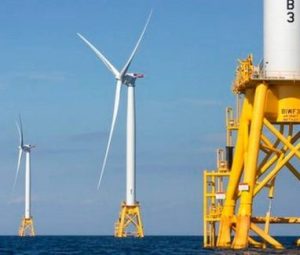
Wind farm, groups agree on whale protections
The developers of an offshore wind farm and three environmental organizations announced Monday that they have reached an agreement to further protect rare North Atlantic right whales during construction and operation of the energy-generating project. The agreement involving Orsted and Eversource, developers of South Fork Wind off the coast of New England and New York, was signed by the National Wildlife Federation, the Natural Resources Defense Council and the Conservation Law Foundation, the groups said in a joint statement. >click to read< 21:08
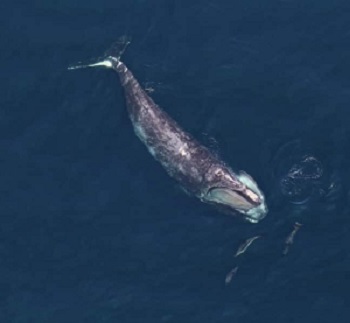
North Atlantic Right Whale: Oceana Wins First Step In USMCA Complaint
The Secretariat for the Commission for Environmental Cooperation, part of the United States-Mexico-Canada Agreement (USMCA), has agreed to move forward with the first step in a two-step process to investigate the USA’s failure to uphold its environmental laws to protect North Atlantic right whales, according to an Oceana announcement this week. The decision was in response to Oceana’s filing the first-ever “Submission on Enforcement Matters” against the US government under the USMCA last October. The ocean advocacy organization claimed the government has violated the USMCA by failing to enforce environmental laws to protect critically endangered North Atlantic right whales, of which only around 330 remain. >click to read< 14:53
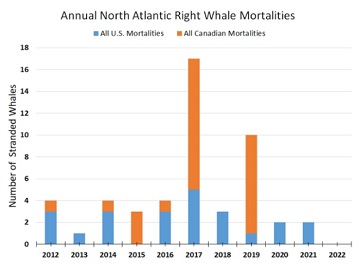
Right whale numbers may be stabilizing after some bad years, but their future remains uncertain
All in all, it’s been so far so good this year, No dead right whales have been spotted. Fifteen calves were born, the second-largest number since 2015. Michael Moore, a senior scientist at the Woods Hole Oceanographic Institution, recorded a recent encounter with a right whale off Massachusetts. Regulators in Canada are responding to the whales arrival this year with large-scale closures of fishing areas to snow crab traps that depend on vertical rope. >click to read< 10:52



































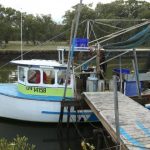


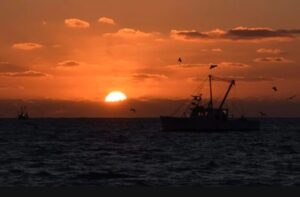
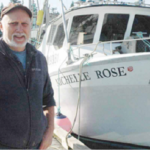

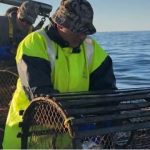
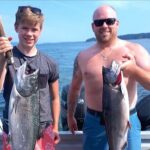
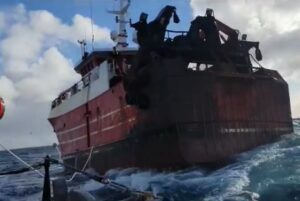
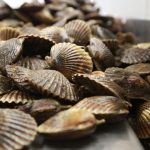
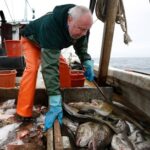



Maine’s leaders seek more time on whale protection rules
Maine Gov. Janet Mills is seeking to delay new federal whale protection rules, citing fears the state’s commercial lobstermen won’t be able to comply. In a letter to Commerce Secretary Gina Raimondo, Mills urges federal fisheries regulators to extend the period for collecting public comment on the new regulations, which are aimed at protecting critically endangered north Atlantic right whales by setting a seasonal closure and requiring modifications to gear. Mills said she believes it is “unconscionable” that the National Oceanic and Atmospheric Administration only plans to hold one remote public hearing on the new regulations, which call for reducing by 90% the number of Atlantic Coast fixed gear fisheries, including lobster industry. >click to read< 15:14
Share this post